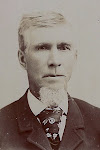Ducklow From Dukelow
Those of us with the Ducklow surname could easily be spelling and pronouncing our name as Dukelow. In fact, many of our distant relatives are Dukelows. By one accounting, the Dukelow name is three times more common than Ducklow in America. Thomas’ father, John, was a Dukelow. Thomas himself was called Dukelow when he first arrived in Dodge County in 1848.
So how is it that today we call ourselves Ducklows?
Neither Thomas or Elizabeth could read or write English. Legal papers, census records and church documents dating between 1840 and 1880 show a range of spellings including: Dukelow, Duclo, Duclow, Ducklow, and Duklow. Each time a census was taken, or a legal document prepared, the spelling was completely up to the clerk at hand. Thomas and Elizabeth both signed with an “X” (* see footnote) and apparently neither could rectify incorrectly spelled names. So anyone recording the name likely spelled it the best they could based on how they heard it pronounced. Or perhaps how others in the area spelled it. Try saying “Dukelow” with a strong Irish bough and ask a stranger spell what they hear; you’ll see why there are many variations.
But most curiously, from the year 1885 forward, the spelling on legal documents and records becomes a consistent spelling of "Ducklow."
The first adult child of Thomas and Elizabeth’s to die was Thomas junior, their fourth child. And his was a sudden and tragic death. On the early morning of July 30th of 1885 a summer thunderstorm struck Dodge County. Thomas and a hired hand were asleep in a farmhouse. This was not the main Ducklow residence, but rather a house that was part of new land that the family acquired. It likely was to have been the new home for him at age 36.
Thomas and a hired labor were asleep in two beds in an upstairs bedroom. The room had an exposed chimney stack, and the beds were set near it. As the thunderstorm passed, lightening struck the top of the chimney and traveled down. On its path to find ground it jumped from the chimney stack to the metal-framed bed were Thomas slept, killing him instantly. Fate was kinder to the hired hand. He was not injured, but jolted awake. When he realized the event that had just occurred, he went to the main farmhouse and alerted the family to the awful tragedy.
The family grieved hard. One display of their grief is the large (10’ tall) and ornate grave marker to pay tribute to Thomas’ memory. The tombstone of course needed to have his full name with accurate spelling. This forced the family, or more precisely the literate adult children, to decide upon a spelling. At this point the children must have agreed to spell Thomas junior’s surname as "Ducklow."
But why Ducklow and not Dukelow?
A reasoned assumption is that the Ducklow spelling most closely matched the way the children heard their parents pronounce it. So the family paid a mason to chisel the stone that marks Thomas’ grave. The chiseled stone is more than just grave marker. It is also the marker that set forth the spelling of Ducklow for all that descend from Thomas and Elizabeth.
 The primary supporting evidence for this line of discussion is that Thomas and Elizabeth’s grave markers are chiseled with the Ducklow spelling, as are all the grave markers for their seven sons and one unmarried daughter. [Their married daughter’s graves stones are marked with their spouses’ surname]. In addition to consistency in grave marker spellings, census records and other public documents recorded after 1885 mainly use the "Ducklow" spelling.
The primary supporting evidence for this line of discussion is that Thomas and Elizabeth’s grave markers are chiseled with the Ducklow spelling, as are all the grave markers for their seven sons and one unmarried daughter. [Their married daughter’s graves stones are marked with their spouses’ surname]. In addition to consistency in grave marker spellings, census records and other public documents recorded after 1885 mainly use the "Ducklow" spelling.The Ducklow spelling is unique compared to the rest of Thomas’ family who came to America with him. All of Thomas’ half-brothers (John, Samuel, Richard, Peter and Frank) who settled in southern Wisconsin have grave markers with the original Dukelow spelling.
Photo Left: Grave stone for Thomas Ducklow, son of Thomas and Elizabeth Ducklow [Dukelow] Located in St. Paul's Cemetery, Ashippun Township, Dodge County, Wisconsin. It is one of the largest stones in this cemetery standing about 10' tall.
*Footnote: The evidence that Thomas was illiterate occurs in his Declaration of Intention document where he claims his allegiance to the United States, signed on 2 March 1844. Thomas made his oath in front of a clerk in City of Rochester, New York where in two places Thomas he uses an “X” to sign his name; His name is then written out (signed) in the same hand (not Thomas’) used in the rest of the document. The evidence that Elizabeth was illiterate occurs in her last will and testament, as witness by an attorney she signs her will with an "X."


No comments:
Post a Comment